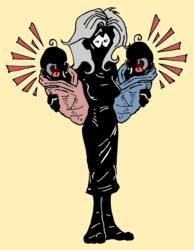 What happens in a culture where women are married as teenagers, frequently to much older men, where it is popularly believed that contraceptives cause long-term health problems, where contraception is something that husbands and wives do not speak about to each other, where religious leaders are outspoken in their opposition to contraception, and where children are a symbol of wealth? An out-of-control baby boom, of course, accompanied by poverty and starvation.
What happens in a culture where women are married as teenagers, frequently to much older men, where it is popularly believed that contraceptives cause long-term health problems, where contraception is something that husbands and wives do not speak about to each other, where religious leaders are outspoken in their opposition to contraception, and where children are a symbol of wealth? An out-of-control baby boom, of course, accompanied by poverty and starvation.
In Senegal and many other parts of West Africa, the majority religious belief is that Allah is the one who gives children, and he is in charge of providing what they need to grow healthy and strong. It is not right for people to interfere with what Allah does. Thus, in Niger, for example, the fertility rate is over 7. That is, the average number of children produced by each woman during her lifetime is more than 7. Unsurprisingly, UNICEF had to treat more than 850,000 severely malnourished children in the Sahel region last year.
The Senegalese government is making some efforts to slow the population boom, but is facing resistance in the form of entrenched cultural practices. Only 12% of Senegalese women use contraceptives, one of the lowest rates in the world. The government hopes to provide family planning services to 350,000 women over the next 3 years and hopes to increase the contraceptive prevalence rate to 27%.